Inamori Library
3F Philosophy: Exhibition Details
About the Philosophy
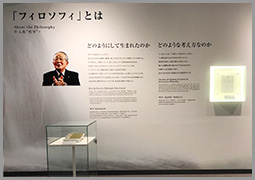
How the Kyocera Philosophy Was Created
While I was managing Kyocera, I encountered many difficulties. Although I often struggled, I was able to surmount all obstacles. The Kyocera Philosophy was born under these circumstances as I constantly debated with myself about my life and work.
The Kyocera Philosophy is a life philosophy that I acquired through practice. Its basis is "living in the right way as a human being." I have thus been encouraging our employees to follow this philosophy, as I believe it will make each employee happy while making our company prosperous.
The Way of Thinking Promoted by the Kyocera Philosophy
The philosophy is a guiding principle for work and life created as we seriously confront basic questions such as, "What do we consider to be the right choice as a human being?" and "What is the purpose of life?" while trying to overcome various difficulties. This management philosophy has guided Kyocera's progress to this day.
The Philosophy Incorporates Four Important Factors
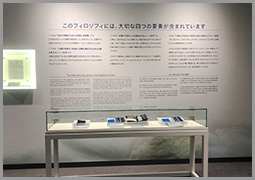
The first factor is "the regulations and agreements which constitute the company's standards." Incorporated in this factor are the rules and morals advocated within the company to reflect these management standards.
The second factor is "the attitude necessary for the company to achieve its goals and objectives." This states the specific attitude and actions necessary to achieve the high objectives set by the company.
The third factor is "create a wonderful corporate character." Just as human beings have personal character, companies also have corporate character. The way to gain trust and respect worldwide is for the company's "corporate character" to be so impressive that people say, "That is indeed a company with an admirable corporate character."
Although these factors are extremely important for the company to make further progress, there is a crucial fourth factor that underpins the other three to create the philosophy. That is the element that shows "the right way to live" and "how we should behave as human beings." It expresses the universal truth of life necessary for each of us to live in a better way.
What is most important is for us to actively practice the philosophy, derived from these four factors, in our daily work and life, rather than only retaining it as superficial knowledge. Unstinting efforts in practicing the philosophy elevate the mind and refine one's character. I am convinced that a bright future overflowing with hopes and dreams will surely open up for a group consisting of people who share this philosophy.
About Life
Live a Wonderful Life

The Result of Life and Work = Attitude × Effort × Ability
I believe we can express the result of life and work with the following formula: Attitude x Effort x Ability.
How I Arrived at this Formula
I was unable to achieve my aspirations to enter the middle school or university I desired. Nor was I able to find employment with a top company. Ever since I began working, I constantly wondered, "What does an ordinary person like me have to do if I want to live a wonderful life?"
I see among those around me that there are people who succeed in work and life while others fail. Looking at these people, I wondered, "Why do some people do well in their work and life while others do not do well? Is there some sort of law at work?"
In answer to these questions, I came up with this formula shortly after I founded Kyocera. Since then I have followed this formula as I put my energy into working and progressing along my path in life.
My Formula
This formula is composed of three elements: ability, effort, and attitude.
Ability results from intelligence, physical capability, health, and other factors that come from one's parents or from heaven. They are innate--beyond the will or control of each individual.
Effort combines with ability. There is a vast difference in the effort made by those who are apathetic and lacking in self-discipline, motivation, or ambition and the diligent efforts made by people who have a burning passion for their life and work. Effort is something that each individual can deliberately choose to exert more or less of.
I have worked hard to put forth the greatest possible effort by applying myself unstintingly and striving to be the best.
Attitude is involved as well, and is the most important factor. It can be a positive or negative multiplier: if one has a negative attitude, then the greater one's ability and the stronger one's effort, the more negative the product of this formula will be. But if one has a positive attitude, then the result of one's life and work will be a correspondingly higher positive number. Hataraki Kata [The True Meaning of Work]
Live Each Day Earnestly
Life is a drama where each of us plays a leading role. The question is, "What scene will we write for this drama?"
Some lives may be totally at the mercy of fate. However, I believe that we can write our own script and play the leading role by transforming our hearts and souls. Indeed, our lives depend on how we script the scene for ourselves. The storyline would be totally different for a person who leads an aimless life compared with one who tries to live earnestly.
Your Life is an Expression of Your Mind
The result of our actions is determined by what we conceive in our minds. If we have a strong desire to succeed and visualize it in our minds, then we will. On the other hand, if we think, "Maybe we can't," or "Maybe we will fail," then we are likely to fail.
I believe nothing comes to us that our mind has not summoned. Thus, each phenomenon around us is a reflection of our own minds.
Have Ambitious Dreams
Reality is harsh. We often find it difficult just to survive until tomorrow. Even then, our lives depend on our ability to draw our future vision. It is essential to maintain ambitious dreams and goals of how we want our work and our lives to be.
We must have splendid dreams and follow them throughout our lives. This gives meaning to our lives and makes them more enjoyable.
How to Elevate Ourselves
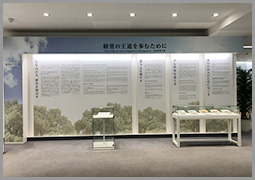
Elevating Our Minds Throughout Our Lives
Our Purpose in Life
Where do we find purpose in life? To this most fundamental question, I would like to respond simply that it lies in elevating our minds and refining our souls.
We engage in sincere efforts every day hoping to make today better than yesterday, tomorrow better than today. I think that our purpose and value in life is found in our persistent work, sincere efforts, and humble pursuit of the truth.
This life is the time given us to elevate our minds and is the place for discipline in refining our souls.
First and foremost, isn't the meaning of our lives and the value of human life found in elevating our minds and refining our souls?
As we live in this secular world, encounter many joys and sorrows, and are washed over by waves of happiness and unhappiness, we should live earnestly without letting up until the day we no longer take breath. This process itself acts as the polishing stone that elevates our human nature and disciplines our spirit. I think there is no other purpose in life than leaving this world having attained a higher level for our souls. Ikikata (A Compass to Fulfillment)
The Right Way to Live as a Human Being
People may laugh when I espouse the sort of lessons taught in grade-school ethics. But is it not because we adults have not been able to follow what we learned in grade school that societal values have been so shaken and we see such moral decay?
How many adults can speak confidently about morality to their children? Who is able to expound on ethics and show clear examples of what should be done and what should not be done? How many people have this kind of insight and spirit coupled with substance of character? I am overcome with shame when I consider this.
The right way to live should not be difficult. What is required now is the re-evaluation of the meaning of the simple morality we learned as children from our parents -- don't tell lies; be honest; don't deceive others; don't be greedy -- and to strictly abide by it. Ikikata (A Compass to Fulfillment)
Always Be Humble
As our society becomes increasingly affluent, the number of self-centered and opinionated people also seems to have increased. Such mindsets, however, cause egos to clash, and make it impossible to work together as a team. To align team members' vectors, create a pleasant work environment, and manage a productive workplace, we must maintain a sense of humility and gratitude, with the awareness that the support of others has brought us to where we are now.
Always Remain Cheerful
Life is wonderful and full of possibilities. We must continually remind ourselves that "a wonderful life awaits me!" We should never complain or feel gloomy, hold a grudge, or harbor hatred or envy toward others. Simply having such negative thoughts can make a person's life miserable.
Though it may sound too simple, having hope for the future and acting cheerfully and positively are the first steps toward improving our work and our lives.
Live in Harmony with the "Will of the Universe"
The world seems to have a "flow" that evolves and develops everything. I call this the "will of the universe." This will is filled with love, sincerity and harmony. Our personal destiny depends on whether the energy emitted by our mind is in harmony with the universal will or not.
Fortune smiles upon us when we make a wish with a pure mind that is in harmony with this universal will.
Improving Your Work

Love Your Work
The best way to fire yourself up is to love your work. If you put all your effort into accomplishing your job, no matter what it is, you'll gain a great sense of achievement, confidence, and the motivation to face new challenges. Repeating this process enhances your fondness for your job. Then your work is no longer a burden and you can achieve wonderful results.
Fall in Love with Your Work
People in love are unfazed by their ability to accomplish things that others find astounding.
It is the same with work. You must become infatuated with your work and love it.
Even if others think your work is "so difficult and severe, it must be very hard. He can't possibly withstand it," if it is work that you are infatuated with and love, you can endure the hardships.
Become infatuated with your work.
Fall in love with your work.
This is the very reason I have been able to persist for so long engaged in difficult work.
If it is work that they love, people will not mind enduring any hardships. And if you can persist in your efforts, overcoming any hardship, most everything will lead to success. As a result, it is no overstatement to say that the single act of loving your work determines the path of your life.
In order to live a fulfilling life, you must either "do work you love" or "learn to love your work." Being able to do work you love is rare, and only one person in a thousand or in ten thousand may be so blessed. Even if you are hired by the company you hoped for, it is rare to be assigned to a preferred place of work or a highly desired job.
Most people seem to start their lives working in jobs they don't like.
But the problem is that many of them continue to work grudgingly in an occupation they dislike. They continue to be disgruntled, grumbling and complaining about their work. Such behavior is a sure way to waste a life full of wonderful possibilities. We must learn to love our work no matter what it takes.
What is important is to put ourselves into a state of mind thinking that the "work given to us" is our calling in life. Unless we throw off the perception that we are being forced to work, we cannot escape from feeling the hardship of working.
This is what I want to emphasize to young people: "Rather than seeking work that you love, start by loving the work you are given." Searching for work that you love is like looking for the "bluebird of happiness." Rather than pursuing such a phantom, make an effort to love the work you have right in front of you.
If you love your work, you can throw yourself into it without minding the hardships or feeling that making an effort is a burden. If you can throw yourself into your work, you will strengthen your abilities in due course. As you strengthen your abilities, results will surely follow. Your results will then be appreciated by those around you. With this appreciation, you will come to love your work more. This is how a favorable cycle begins.
The first step is to develop a strong will to love your work. There is no other way. This is the way that leads to a meaningful and productive life. Hatarakikata [The True Meaning of Work]
Accumulate Tedious Efforts
Even if you set a big goal, your daily work still requires many mundane, tedious tasks. In any field, wonderful outcomes are the result of tedious efforts, whether that means making step-by-step improvements, collecting data and conducting experiments, or taking orders door-to-door.
We must remember that no great feat is accomplished overnight. It is always a step-by-step accumulation of tedious efforts.
Adhere to Perfection
Some people are satisfied if things are 90% successful. But such people can't produce "sharp" products. With an easygoing mindset that assumes any mistake can be removed with an eraser, we will never achieve truly satisfactory results from our work.
Always Be Creative in Your Work
While working hard, you must ask yourself daily whether yours is the best way to do the job, and take actions to improve and innovate. You shouldn't just mindlessly repeat what you did yesterday. In your daily work, you must constantly ask whether you are doing things correctly and question every part of your work. You should continuously seek to improve your work--to make your work better today than yesterday and better tomorrow than today. This will increase the creativity in your work.
On Management
Becoming a True Leader
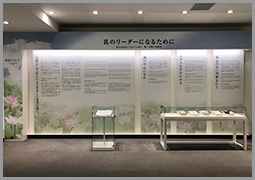
Commit to What Is Right as a Human Being
The criterion on which human beings judge what is right derives from the most fundamental ethics and morality that people possess based on an intrinsic conscience. The simple and primitive teachings that we must naturally abide by as human beings are the same teachings that we all learned from our parents and teachers: "Don't be greedy," "Don't deceive others," "Don't tell lies," and "Be honest."
Our daily judgments and behaviors must be based on these teachings of what is universally right as human beings and not on what is most personally expedient.
Pursue What Is Right as a Human Being
When I started out, I knew nothing about management, but through fate, when I was 27 years old, Kyocera Corporation was founded and I began to manage the company. Although it started as a small company with only 28 employees, I immediately faced a mountain of issues that required resolution. The staff would come to me constantly asking for decisions on this matter or that.
With no management experience or economic and financial knowledge, I had to make decisions on many matters. I was at a loss as to what I should base my decisions on.
After I wrestled with this problem, I concluded that my standard for judgment would be, "What is right as a human being?" That is, to base my decisions on the most fundamental of ethics: "Is it right as a human being or is it wrong?", "Is it good or is it bad?"
Present-day society may not be ideal, as illegal acts occur in a brazen manner and many people behave in selfish and willful ways. But no matter what the state of the world, I have decided to ask myself, "What is right as a human being?" and do what everyone can see is right; in other words, I will pursue what is universally right as a human being and continue to strive for these ideals.
"Pursuing what is right as a human being" means to base your behavior, no matter the situation, on respecting the most important values, expressed by words such as justice, fairness, righteousness, discipline, courage, philanthropy, humility and sincerity.
When I look back on the way I have been able to nurture Kyocera and KDDI to become substantial companies despite my lack of management experience, I think it is because I devoted myself to pursuing "what is right as a human being." Seikou To Shippai No Housoku [Laws of Success and Failure]
Be the Center of the Vortex
No one can accomplish his/her work alone. In your work, you must cooperate with people around you--your supervisors, subordinates and colleagues. However, you must aggressively pursue your work yourself, so that those around you will spontaneously cooperate with you. This is what I call "working at the center of the vortex."
Align Mental Vectors
Human beings differ in their mindsets, but imagine what would happen if employees all behaved inconsistently according to their own mindsets.
If employee vectors (efforts) are not aligned, the group will not be cohesive and will not generate any momentum for the company.
When all efforts are aligned, the force they create multiples to produce amazing results. One plus one becomes five, or even ten.
Make Unselfish Decisions
As human beings, we tend to think only of our own benefit. If we put our ego first and fail to be considerate of others, it will be difficult to obtain the support of those around us and our work will not go smoothly.
In our daily work, we must control our selfish minds and constantly ask ourselves if our decisions are righteous as human beings, rather than biased by our own selfish interests.
Challenge Yourself to Accomplish New Things

A Strong, Pure Motive Will Lead to Success
A strong, pure motive will lead to success. In order for things to turn out successfully, you must have a strong motive.
Simply having a motive shapes our lives, but if the motive is so strong that it enters into our subconscious, there is even higher potential for success. Taking this further, if you can turn your motive into something purer and more beautiful, it will come true in a most powerful way.
The Enormous Power Contained in a Motive
It is not widely believed that there is power contained in a motive. Actually, our motives have enormous power, far beyond our imaginations.
However, that motive must be beautiful, honest, positive, and kind -- in a word, it must be pure.
We can occasionally observe someone with a pure motive easily carry out difficult work.
For example, a person who has a pure motive and a strong wish to realize it can proceed without any hesitation on a difficult project that even those with brilliant abilities may find daunting. Those around him, knowing the difficulties, watch and think, "He'll fail at any moment," but to their surprise he succeeds with ease. When they come across such a case, they wonder how it could have happened.
I think it is because a pure motive has enormous power, stronger than any brilliant intellect. A beautiful motive that wishes "the best for others" gains support from others, as well as from the heavens. This leads to success. In contrast, no matter how one schemes and manipulates his intellect, if a base, selfish motive is at the core, that person will not gain the cooperation of those around him or help from the heavens, and will encounter many obstacles and setbacks.
I had this experience when I started what was to become the present-day KDDI. Wishing to lower the communications rates paid by Japanese citizens, I intended to enter into the communications business. For six months, I kept asking myself what my motive was. I questioned myself thoroughly as to whether my desire to start KDDI held any selfish interest with this question: "Is your motivation pure and selfless?" Each night without fail I questioned my intention, and when, after six months, I was able to convince myself that my intention was not egotistical, I finally entered into the communications business. I found that many people, including the employees of KDDI, sympathized with my desire and genuinely cooperated with me. As a result, KDDI, which started off in the most disadvantageous condition, has been able to grow and develop to this day. Seikou To Shippai No Housoku [Laws of Success and Failure]
Maintain an Ardent Desire that Penetrates into Your Subconscious Mind
Achieving a lofty goal begins by having an ardent and persistent desire focused on how we want things to be.
Concentrating day and night on this pure and ardent desire, our vision eventually penetrates into our subconscious minds. In such a state, the subconscious mind begins to perform astonishing deeds--even in our sleep--and directs us toward attaining our goals, independent of our conscious selves.
Pursue Unlimited Human Potential
People who accomplish new things in their work are people who believe in their potential. If we determine what we can or can't do by considering only our present capabilities, there is no way that we can accomplish something new or difficult. Human potential expands limitlessly as we struggle to improve.
We must always believe in our unlimited potential and maintain an attitude that bravely meets all challenges.
Conceive Optimistically, Plan Pessimistically, and Execute Optimistically
To accomplish something new, it is very important to set the target very optimistically with hopes and dreams of how we want things to be.
In the planning process, however, we should review our concept from a pessimistic perspective while maintaining a strong will to achieve our goal no matter what. We should try to identify all potential problems and carefully consider countermeasures for them.
During the execution process, we should proceed optimistically, cheerfully and boldly, confident that "We can do it."
Expand Your Business

Management Based on the Bonds of Human Minds
The companies I managed developed because employees exerted maximum efforts and managers devoted their lives to earning everyone's trust. I wanted them to be excellent companies where all employees could believe in each other, abandon selfish motives, and be truly proud to work.
Kokoro (the Mind) Can Achieve Great Things
I managed my company based on the bonds of human minds. As a manager, I focused on how to achieve a strong, mutually trusting bond between human minds within the company.
Just as it is necessary to love in order to be loved, to create human relationships based on the bonds of human minds requires that the manager himself have a wonderful mind that inspires others with wonderful minds to rally together.
Believing this, I admonished myself for my own willful behavior as a manager. My attitude toward work is to let go of selfishness and to put my life on the line for a company that employees will truly care about.
Certainly, nothing is more unreliable, fragile, and changeable than the human mind. But I also think there is nothing stronger or more valuable in this world. When we look back through history, the great achievements accomplished through the bonds of human minds are too numerous to mention. Conversely, we also find many examples where groups of people were destroyed because of moral decay.
We must not forget that the mind attracts those with similar minds.
Build Trust within Yourself
Without trusting human relationships, corporate management cannot succeed.
How do we build trusting human relationships?
Initially, I thought I would try to create a circle of colleagues that I could trust. That meant looking for trust outside of myself; however, I found this was not the right way to go about it. I sought trust outside of myself, but I found it not to be. I realized then that unless I possessed a mind that others could trust, I would not be able to gather trustworthy people around me. Human relationships built on trust are a reflection of one's own mind.
I have been betrayed many times by others, but that is okay. I will continue to have absolute belief in people. As I repeatedly ask myself whether my own mind is worthy of others' trust, I want to elevate my mind ever higher.
Even though I might sometimes get short-changed, I will continue to believe in people as it is the only way a relationship of trust can be achieved. Trust is not something to seek outside of ourselves, but something we must seek within ourselves. Kokoro Wo Takameru Keiei Wo Nobasu [Elevate Your Mind and Expand Your Business]
The Extended Family Principle
Cherish the mutual trust that ties us together as a family, sharing the joys and sorrows of others as our own. Therefore, when one member has a problem at work, we can help each other unconditionally, as a family would. Even for personal matters, we can discuss the problem empathetically. "Management based on the bonds of human minds" means cherishing this family-like relationship.
Commit to the Principle of "Pricing Is Management"
Pricing dictates the success or failure of management. There are infinite levels of pricing, ranging from a paper-thin margin that maximizes units sold, to a lucrative margin that limits sales.
It is very difficult to forecast how many units you will sell at which price margin or how much profit you can make. Therefore, we need to accurately assess the value of our products and find the point where the number of units sold times the profit margin is maximized.
Fully Implement "Maximize Revenues and Minimize Expenses"
Managing a business is a simple matter. It is based on maximizing revenues and minimizing expenses. Profit is simply the difference between the two. Therefore, we need to be concerned only with maximizing revenues and minimizing expenses.
We must not be trapped by conventional or fixed ideas. The important thing is to exercise our creativity and exert tenacious efforts to maximize revenues and minimize expenses every day.
Following the Path of Righteous Management
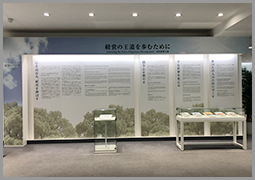
Elevate Your Mind and Expand Your Business
We can always make correct judgments and expand our business by elevating our minds - that is, by refining our minds - and working to develop an honorable character.
Why Must We Elevate Our Minds?
There are instances when the owner of a company does well when it is small, but as the company's scale expands, he is no longer capable of good management.
I think this occurs not only due to the limits of his professional abilities, but also because his human qualities as that group's leader have not been elevated in line with the growth of the organization. As a company grows, its problems also grow. Issues become more serious and more complicated. If a leader's human qualities have not been elevated, he will be unable to successfully confront these new situations.
There is no other way to increase corporate performance to a more impressive level than for the manager to elevate his human qualities and refine his character. I persist in saying, "Elevate your mind and expand your business" to reiterate that elevating one's character leads to increased company performance and organizational growth.
Why must managers continue to elevate their minds? It is so they can make correct management decisions. The performance of a company is the cumulative result of its manager's decisions; this being so, the manager must continue to make correct judgments. In order to continue making correct judgments, a firm standard for judgment is essential.
Yet, in general, when asked to make a decision, too often the standard is based on "gain and loss." When judgments are based on self-interest -- whether something is advantageous or disadvantageous for an individual -- faulty decisions are often made.
In order to achieve a correct outcome, decisions must be made by considering the pros and cons of an issue in light of "what is right as a human being" -- in other words, what is right and wrong.
This is the reason we must always continue our efforts to elevate our minds. If we neglect the work of elevating our minds, our standard for judgment will be based on the low-level criteria of gain and loss, leading to the wrong outcome. By refining your mind and working to attain an honorable character, it becomes possible to make correct decisions based on right and wrong. This allows for management without error and leads to the expansion of business.
Seiwajyuku 18th National Convention Speech (9/8/2010)
Raise Our Fighting Spirit
Business is a real battle. We must always face it with an invincible attitude to be victorious.
We may flinch out of fear and compromise our original beliefs. The energy to fight off such difficulties comes from an invincible fighting spirit. As in a combative sport, we need a fierce fighting spirit to break all barriers and lead us to victory.
However painful and strenuous these challenges may be, we have to build a fierce fighting spirit that helps us to "never lose and always achieve."
Change the World We Live In
Even within the same industry, companies can exhibit stark contrasts in performance, where one is making a profit and the other is running a deficit.
Every company is making earnest efforts. However, if a deficit-ridden company simply exerts the same kind of efforts as a profitable company, they will never be able to break out of their situation. Such a company must exert extraordinary efforts in one fell swoop to be effective. For example, if a deficit-ridden company worked on reducing cost to an extent several times greater than a profitable company, then they can move into the black and catch up with their competitors. "Change the world we live in" means a drastic restructuring of the current situation.
Serving the Greater Good of Humankind and Society
The highest calling for a person is to serve the greater good of humankind and society. People are tempted to be selfish and do what only benefits themselves. However, humans also have a beautiful mind capable of altruism, which fills us with a sense of satisfaction when we are able to help others.
Our altruistic capacity can become overwhelmed if selfish motives are strong. We must therefore suppress our selfish motives and serve the greater good of humankind and society with an altruistic mind.
About the "Twelve Management Principles"
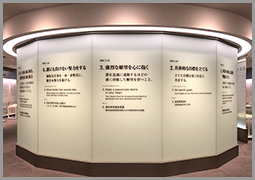
While managing Kyocera and KDDI, I distilled the basic truths and principles for successful management into what I call the "Twelve Management Principles." The word "management" conjures up an image of a complex entity with intertwined elements. However, I tried to make it simple by extracting the underlying principles and mechanisms from complex phenomena. In other words, I believe, once you have mastered the basic truths and principles, it is not difficult to manage a business.
"IHA 2002 Kyoto" Keynote Lecture (April 6, 2002)
1.
Clearly State the Purpose and Mission of Your Business.
Set high objectives that are noble, just and fair.
2.
Set Specific Goals.
Once targets are set, share them with all employees.
3.
Keep a Passionate Desire in Your Heart.
Your desire must be strong and persistent to permeate your subconscious mind.
4.
Strive Harder than Anyone Else.
Work steadily and diligently, one step at a time, never relenting in tedious tasks.
5.
Maximize Revenues and Minimize Expenses.
Measure your inflow and control your outflow; don't chase profit, but let it follow your effort.
6.
Pricing Is Management.
Pricing is top management's responsibility: to find that one point where customers are happy and the company is most profitable.
7.
Success Is Determined by Willpower.
Business management requires a persistent, "rock-piercing" will.
8.
Possess a Fighting Spirit.
Management requires a more combative mentality than any martial art.
9.
Face Every Challenge with Courage.
Do not behave like a coward.
10.
Always Be Creative in Your Work.
Innovate and improve continuously. Today should be better than yesterday; tomorrow, better than today.
11.
Be Kind and Sincere.
Business is based on partnerships and must bring happiness to all parties.
12.
Always Be Cheerful and Positive. Hold Great Dreams and Hopes in the Pureness of Your Heart.
The Six Endeavors
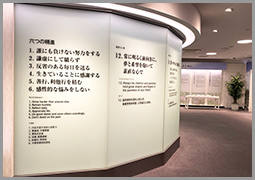
- Strive Harder than Anyone Else.
- Remain Humble.
- Reflect Daily.
- Appreciate Life.
- Do Good Deeds and Serve Others Unendingly.
- Don't Dwell on the Past.